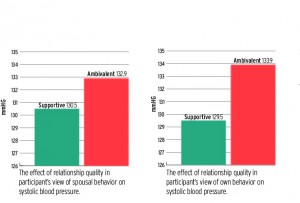
Couples in ambivalent marriages experienced higher blood pressure than their supportive couple counterparts, according to a recent study led by BYU psychology professor Wendy Birmingham.
Ambivalence means the coexistence of both highly positive and highly negative feelings towards a person, object or action. In this context, an ambivalent marriage is a marriage that has high levels of positivity and negativity, which is what some might call a ‘frenemy’ relationship.
While Birmingham did not use the word ‘frenemy’ to describe her research she admits that it is a ‘more trendy’ term that describes an ambivalent relationship. She said she has always been drawn to both health and relationships so being able to study the effects that relationships can have on health was a perfect fit for her.
“Marriage is one of the most central relationships that we have and a lot of the research that’s been done before on marriage has looked at marriage in a unidimensional way of measuring,” said Birmingham, who has completed her Ph.D and post-doctorate study.
She explained that marriage research is often put into one of two categories: supportive or non-supportive, happy or not happy. Birmingham said that marriage does not have to be one extreme or the other. She said marriages have many positive strengths, but they may also have strong negative weaknesses at the same time.
To execute the study, participants reported whether they perceived their own behavior and their spouses’ behavior to be ambivalent throughout a typical day. They then were asked to document their activities throughout the day and report on their interactions with their spouses. Participants wore an ambulatory blood pressure monitor that would read their blood pressure twice every hour.
Bert Uchino, co-author of the study, explained that doing the study in this manner allowed them to see the blood pressure of the participants in a more naturalistic setting.

The results found that couples who identified as being ambivalent in their relationship had worse blood pressure than those who reported that they had little to no negativity.
Birmingham explained that any difference over an extended period of time can have an effect, although the difference in blood pressure from her experiment was not extremely large. She said increased levels of blood pressure can indicate possible increased risk for cardiovascular disease in the future.
“It was not just the blood pressure we found that was different between ambivalent couples,” Birmingham said. “What we found was that ambivalent couples reported less partner responsiveness, less self-disclosure, less spousal-disclosure and less feelings of intimacy with their spouse.”
The assistant professor said these processes are very important to have in a healthy state within a marriage. She said there is additional research that showed that negativity from a partner has a stronger effect on an individual than positivity within a marriage.
“The take home from this is that both of these couples have high levels of positivity in their relationship, but the ambivalent couples are not benefitting from that positivity because of the negativity that is also there,” Birmingham said.
There is a lot of literature out there that shows marriage is good, according to Birmingham. She said marriage can be good for people psychologically, financially and even with regards to health. A study done by The Institute for the Study of Labor in Germany stated that the health gain from marriage may be as large as the benefit from giving up smoking.
“Married people live longer, they get sick less often and they participate in less-risky behavior. There are a lot of things that married people do that’s health-protective. But the quality of the relationship matters,” Birmingham said.
Licensed clinical social worker Wendi Dunford, who worked as a therapist at LDS Family Services for 6 years, shared her knowledge on ambivalent relationships.
She said she has seen that couples who start out with ambivalent relationships tend to become more negative as time goes on if they fail to address it.
“Most often in counseling I see couples who have waited too long before seeking help for the negativity in their relationships,” Dunford said. “Research shows that couples will have problems and wait on average seven years before getting the help they need. Unfortunately, a lot of damage can be done in seven years and the climb back to a more positive relationship is a tough one. Getting help early would be ideal.”
Dunford’s recommendation is that couples should do some pre-marital counseling before tying the knot and not hesitate about getting whatever help they might need. She said there is a stigma against therapy in general American culture, but couples should not let this hold them back from something that could seriously benefit them.

Both Birmingham and Dunford agreed that an ambivalent couple can change and become a supportive couple.
“There are certainly always options to increase the positivity within your marriage, especially things like spousal disclosure,” Birmingham said. “If you’re seeing these ambivalent feelings and negativity, it’s time to improve.”
Uchino said most often people think of diet and exercise when trying to improve their health; relationships often don’t even cross their minds.
“I think the most immediate thing (we can learn from this study) is that it helps us realize that there are aspects of our relationships that can really affect our health in the long term. The quality of people’s relationships really matter,” Uchino said.




